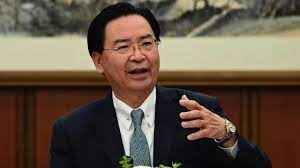TAIPEI: The Chinese threat in the South China Sea is increasing significantly as China has deployed a large number of armed maritime militias in the region besides an array of warships and other military assets, Taiwanese Foreign Minister Jaushieh Joseph Wu has said, calling for united efforts by all stakeholders to deal with the challenge.
Wu also cited China’s growing military activities in the Indian Ocean region, including its attempt to control key ports in Pakistan, Sri Lanka, Myanmar and Djibouti and hoped that New Delhi is paying “close attention” to it.
In an interaction with an international media group, the Taiwanese foreign minister said the countries having stakes in the South China Sea must join hands in combating the challenge emanating from China’s rising military muscle-flexing in the region and that Taiwan is ready to share its experience in dealing with the Chinese threat.
Wu was commenting on various issues including regional security challenges, geo-political upheaval following the war in Ukraine, and the Chinese military threats in the Taiwan Straits.
“India is also facing a threat in its northern borders with China. It is not only the military threat coming from the North, but it is also the Indian Ocean that India might face some challenges,” Wu said.
The Taiwanese foreign minister said the time has come for democratic countries to join hands to face the common challenges from China, including sharing resources with each other.
“China is trying to secure ports along the Indian Ocean in Myanmar, Pakistan, Sri Lanka and all the way to Djibouti. The lessons that we learnt from Port Hambantota in Sri Lanka are significant to us.
China caused bankruptcy in Sri Lanka, and it does not care about the financial situation in these countries.
It is repeating the same model in Myanmar and some other countries.
“We should pay close attention to these developments. This is also something I am sure the Indian government is paying very close attention to and in that regard, I would like to say that the federal democracies facing common challenges from the PRC (People’s Republic of China), need to work with each other,” he said.
China’s ruling Communist Party says Taiwan is a province of the country and has repeatedly warned that the self-ruled island must unite with China, by force if necessary. Beijing has threatened to attack if Taiwan declares formal independence or delays talks on unification.
Wu said the growing Chinese military activities in the South China Sea should be a matter of concern.
“If you look at China’s naval activities in the South China Sea, it is something for all of us to feel worried about. From the data that I can see, from the briefings that I received, I can say that there are more than a dozen Chinese military vessels that are patrolling the South China Sea region,” Wu said.
“And it is not only the military vessels. China also has a large number of maritime militia with fishing boats. There are hundreds of them and they listen to orders of the PLA (People’s Liberation Army),” he added.
The Taiwanese foreign minister said the Philippines had plenty of problems with the maritime militia as hundreds of them in fishing boats come and surround some areas, adding it is a “hard problem for the Philippines”.
He said there is a possibility of Indonesia, Vietnam and Malaysia facing the same problem and that “this requires all of us to find ways to deal with the challenges posed by the Chinese in the maritime domain”.
“There has been a relentless military threat against Taiwan. If you see the situation in the South China Sea, China has been flexing its military muscle, especially trying to intercept military vessels or surveillance aircraft coming from other countries in an undemocratic and unprofessional manner, creating tensions in the South China Sea. The tensions in the South China Sea have been rising tremendously,” he said.
Wu also referred to China seizing control of Sri Lanka’s southern deep-sea port of Hambantota and said there are lessons to be learnt from it, adding Beijing is also responsible for causing financial difficulties for Colombo.
In 2017, Sri Lanka signed a USD 1.1 billion deal with China for the control and development of Hambantota port for 99 years. The deal triggered concerns in India as well as many neighbouring countries.
India does not have formal diplomatic ties with Taiwan but both sides have trade and people-to-people relations. Their bilateral trade relations have been on an upswing.
Following the eastern Ladakh border row with China, some experts in India have been pushing for upgrading New Delhi’s ties with Taipei, especially in the trade and investment sectors.
In 1995, New Delhi set up the India-Taipei Association (ITA) in Taipei to promote interactions between the two sides and to facilitate business, tourism and cultural exchanges.
India-Taipei Association has also been authorised to provide all consular and passport services.
In the same year, Taiwan too established the Taipei Economic and Cultural Centre in Delhi.


